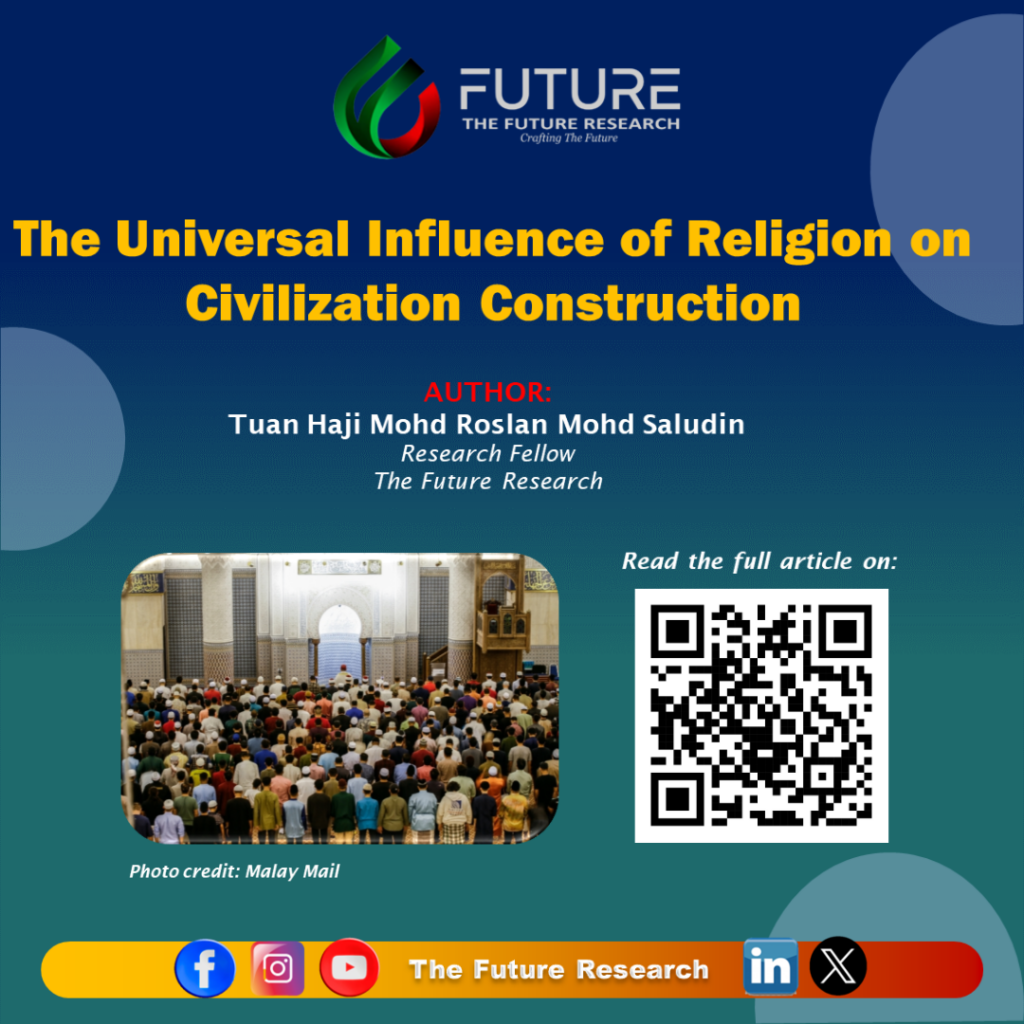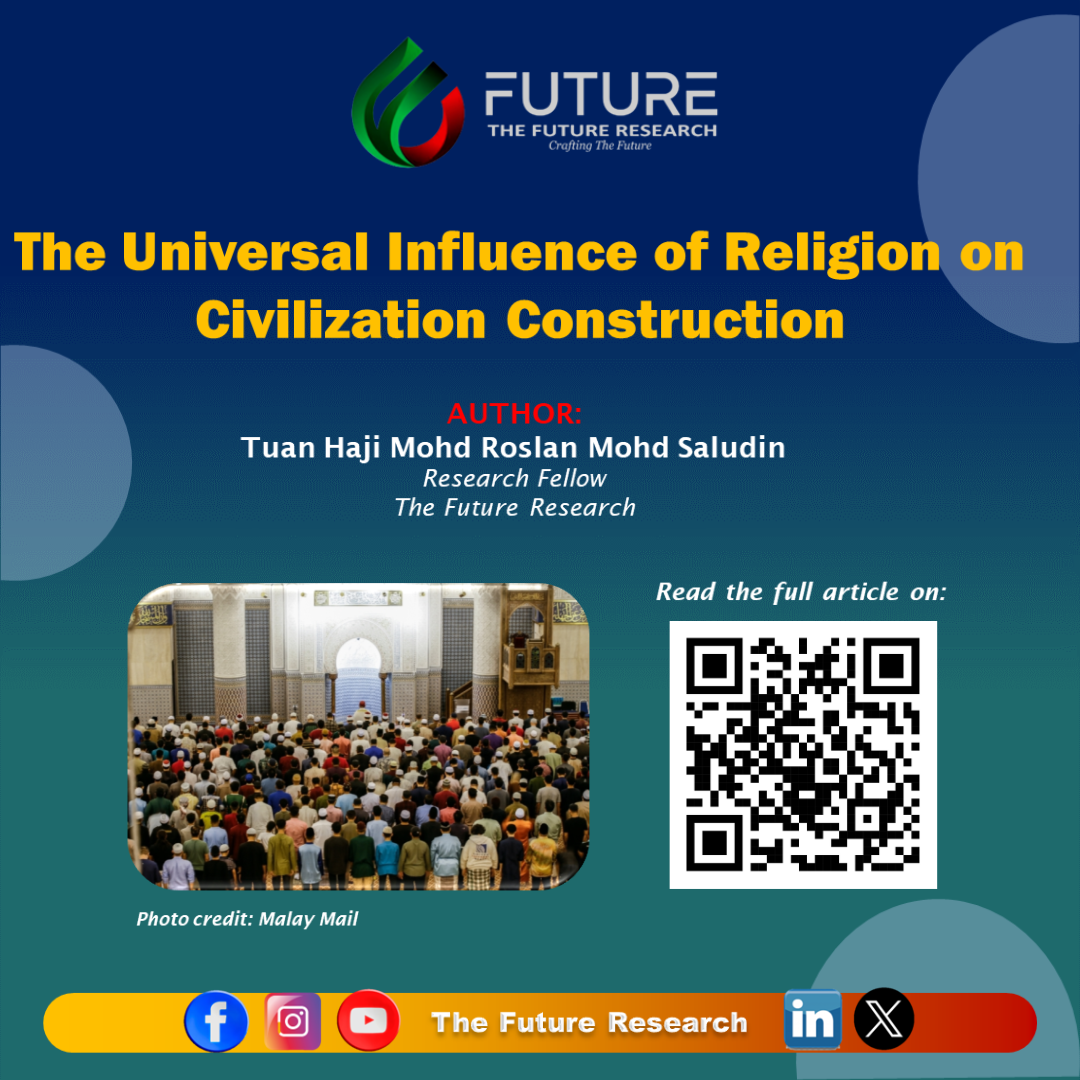
Social evolution has altered orientation and adherence to religion, resulting in the separation of religion from governmet affairs as seen in the history of Western and Islamic civilizations at one point. However, this does not negate the existence and role of religion in shaping values within a society up to the present day.
Secular thinking, though prevalent, for instance in the West, still sees religious values persisting and playing a role in the formation of its society.
Given the universal nature of religion’s influence in shaping societal values, studies of society would be incomplete without considering religion as one of the factors influencing the formation of societal values in a country.
In Islam, religious values are rooted in monotheism (tauhid) and based on faith (aqidah). For Muslims, the values they hold are guided by the teachings and directives of the Quran and Sunnah. As a significant portion of the population in this country is Muslim, Islamic religious values have played a role in the history and formation of Malaysian society up to today.
History records that since having a government, the inhabitants of the Malay Peninsula were Muslims. The Malacca Law Code during the Malacca Sultanate was clearly influenced by Islamic values held by the Malay society at that time.
The arrival of Western colonizers who conquered the Malay Peninsula changed the political landscape of the country at that time. However, up to the British colonization, the influence and values of Islam were never completely sidelined in the formation of the social system that shaped the colonial governance structure at that time.
Certain powers, especially those involving customs and Islamic religious practices, continued to be given to the Malay rulers.
The same was true during the negotiations with the British before the country gained independence. Islam remained a priority in forming decisions for the Muslim community and was recognized by the British. This was proven when the Muslim leaders fighting for independence firmly decided to enshrine in the proposed Constitution that Islam would be the official religion of the country.
This was also agreed upon by other ethnic groups who wanted to be part of the new independent nation of ‘Malaysia.’
As a compromise to the agreement reached, citizenship rights were given to immigrants from China and India. They were also granted the freedom to continue practicing their respective religions within the existing legal framework.
Considering the pluralistic society in Malaysia, a combination of values acceptable to all would ideally be used to shape its society. However, since Islam is the religion of the majority in Malaysia, the values highlighted are naturally linked to its religious beliefs.
For example, the country has introduced alternative economic systems compatible with Islamic values. The principles and practices of Islamic values are also incorporated into administration.
Other values include efforts to combat corruption, eradicate poverty, establish social justice, increase productivity, create an integrated society, strengthen family institutions, emphasize education and the achievement of knowledge and science and technology. Understandably, there has been a consistent campaign to change attitudes towards high moral standards and the practice of noble values in society.
If examined, these values are actually universal and present in all religious teachings.
Therefore, it is not surprising that when Islamic values are implemented in society, there is no opposition or protest from any religious group in Malaysia. All layers of society accept them with open hearts and minds.
For most Malaysians, freedom of religion is guaranteed in the national Constitution. This freedom creates harmony within Malaysian society since independence. Understanding the influence and role of religious values creates a society capable of cooperation and interaction. In other words, a harmonious society in addressing the issues faced.
Non-Muslims, as minorities in Malaysian society today, also do not feel marginalized or excluded. Provisions in the national Constitution provide them the freedom and guarantee to practice the values taught by their respective religions. This freedom has fostered harmony in Malaysian society since independence. This harmony should be maintained and nurtured continuously and enhanced from time to time.
Malaysia has an excellent record as a multi-racial, multi-religious, and multicultural country. Unlike many other pluralistic countries that face significant issues in balancing the influence and freedom of religious values within society. Societies that fail to ensure freedom of religion will fail to create harmony.
All religions call for goodness and harmony in human relationships. Islam, as a religion of ‘peace’ or ‘religion of peace,’ strongly demands that its followers respect others, even if their religious beliefs differ from Islam. Allah says: “O you who believe, be persistently standing firm for Allah, witnesses in justice, and do not let the hatred of a people prevent you from being just. Be just; that is nearer to righteousness. And fear Allah; indeed, Allah is Acquainted with what you do.” (Surah Al-Maidah)
In preserving religious harmony, both non-Muslim and Muslim communities have equally important roles. On the part of non-Muslims, their demands need to be reasonable and rational to avoid clashes that are detrimental to all parties. Emotional, excessive, fanaticism, and self-centered attitudes need to be tempered with reasonableness and rationalism based on justice for all.
Even when facing issues, all parties should choose negotiation to resolve them. Choosing confrontation and acting beyond the limits of humanity, such as committing violence, should be avoided to ensure the integrity of a society and nation.
Failure of a society to create harmony leads to conflict, which ultimately results in a humanitarian crisis.
All religions – Islam, Buddhism, Hinduism, Sikhism, and Christianity – have experienced situations where they were dragged into conflicts, although all these religions advocate peace and harmony among humans. This situation occurs because ‘extremists’ take advantage of something very sensitive to humans, which is religious values, to cause chaos for their hidden interests. Their actual agenda may be political or societal domination, economic control, or territorial supremacy.
In truth, the stability and harmony that have been established will be destroyed if we fail to maintain the harmony and values brought by religion. As the majority religion, Islamic values thus, inadvertently form the basis for building societal harmony in Malaysia.
Tuan Haji Mohd Roslan Mohd Saludin
Research Fellow
The Future Research


Leave a Reply